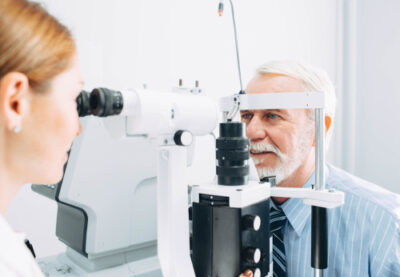When you get cataract surgery, you’re already choosing to see better. By having your cataracts removed, you can fully regain any vision that you’ve lost due to having cataracts.
But because you need to have your natural lens removed to remove the cataract that’s formed inside it, there’s also another choice you have to make. Before you can have cataract surgery, you have to choose what kind of IOL you’ll get.
An intraocular lens, or IOL, is an artificial lens that replaces your natural lens as a part of cataract surgery. IOLs come in many different varieties.
It can be challenging to feel like you know which IOL is the right choice. But if you want to get the most out of your cataract surgery, you should choose a premium lens. Here’s why, along with how to choose the best premium IOL for you:
Standard Vs. Premium

A standard IOL is called a monofocal lens. A monofocal IOL is made from a single, uniform lens that helps you see best at one focal point.
A close focal point helps you see better up close, and a further one helps you see farther away. Most people who get monofocal lenses opt for monovision.
Monovision means putting one lens in one eye with a close focal point and putting a lens with a further focal point in your other eye. Choosing monovision allows the user to see decently at a middle distance.
So why choose a premium IOL? Premium IOLs aren’t usually covered by insurance like monofocals are, but the extra expense is well worth it. Monovision can help you see decently if you have presbyopia, but you may still have to rely on reading glasses, and your vision won’t be perfect at all distances, especially up close.
Premium IOLs, on the other hand, are usually designed to provide a better range of vision and reduce the need for reading glasses. But how do you know which premium IOL to choose? Let’s look at the options.
Your Options
At Sugiki Portis Yim Eye Center, we offer several premium lenses. We offer lenses of the same type that different companies make, so you have plenty of options. Here are the types of premium IOLs you can choose from:
Multifocal
A multifocal lens has alternating rings that switch between a close focal point and a distant focal point. Your eye automatically looks through the section of lens that best helps you see at whatever distance you’re looking at.
Doing this allows you to see very well up close and often eliminates the need for reading glasses.

Trifocal
A trifocal lens also has alternating sections that switch between focal points. But instead of switching between just a close one and a far away one, it also includes an area with a focal point at a middle distance.
Because there is an area with a focal point at a middle range, it allows you to see clearly not only up close and decently far away but also very well at an intermediate distance.
Extended Depth of Focus (EDOF)
An EDOF lens will help you see not at just one specific focal point but rather at a range. Instead of alternating between focal points, it allows you to see clearly within a set range.
Seeing clearly within a set range gives you a more comprehensive field of vision and excellent vision up close and at intermediate distances.
Accommodating
An accommodating lens changes shape depending on what you’re looking at. In particular, an accommodating lens mimics how your natural lens works.
It becomes thicker when you focus on something up close to magnify it. Doing this allows you to see well at many distances, just as your natural lens would.
Toric
Toric lenses are the only IOL specifically designed to correct astigmatism. If you have minor or moderate astigmatism, a toric lens can help you see clearly without glasses while correcting presbyopia like other IOLs.
Consider Your Daily Activities

When choosing between all these options, it’s crucial to think about what you do in your daily life. If you use electronics a lot or work on a computer for your job, you may want to consider an EDOF or trifocal lens.
These lenses help you see well at an intermediate distance, the safest way to view screens. The EDOF also reduces the risk of halo and glare caused by imperfections in the IOL. Reducing this risk makes it great for night owls who often work or socialize when it’s dark out.
If you don’t use electronics much but do a lot of reading or other fine-focus tasks, consider a multifocal IOL. Multifocal IOLs provide excellent up-close vision.
Multifocal lenses are also good if you’re social or active, although you can’t go wrong with any of these options when it comes to social vision. And, if you want to have your astigmatism corrected, a toric lens is the way to go.
Even after considering your daily activities, it can still be hard to choose an IOL, especially when choosing between brands. That’s where your ophthalmologist comes in.
Consult Your Ophthalmologist

You won’t be alone when you’re deciding what kind of IOL you want. Our eye doctors are here to help and guide you through your options.
While the ultimate decision is yours, your eye doctor can give you advice and help you understand the difference between similar IOLs. They will also give you their recommendation on the best IOL for you.
When talking to your ophthalmologist, it’s helpful to discuss what you want out of having cataract surgery. For example: Are you concerned about glare?
Are you okay with still wearing reading glasses? Thinking about what you want to get out of cataract surgery can help your eye doctor set your expectations and make an informed recommendation.
But don’t fret if the decision feels overwhelming. With so many fantastic premium lens options, it’s hard to go wrong no matter what you choose!
Do you think a premium lens may be the way to go when you have cataract surgery? Schedule a cataract screening at Sugiki Portis Yim Eye Center in Honolulu, HI!





